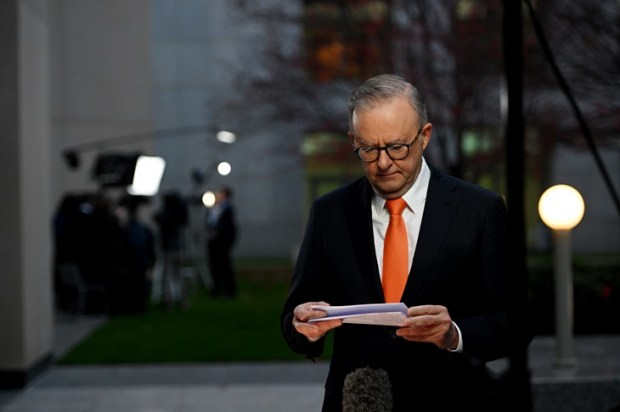I was intrigued to discover a recent piece loosely comparing Ayn Rand with His Majesty The King, and was disappointed when it became apparent that the initial query – ‘Is it only the political movement of Climate Change in which we need to be wary of King Charles III, or does his disposition to the left-wing run deeper?’ – would not be answered.
Questions of this nature cannot be offered flippantly.
Is there anything to be gained by conservatives insinuating that the King of Australia is some nefarious ideologue who seeks to authoritatively impose a left-wing doctrine throughout his realms and territories? I find such arguments to be reckless and counterproductive. Little is achieved by sowing distrust in our nation’s highest institution, the Crown. There exists one entity above all others that we need to be wary of in this country: the Republican. It is he who truly seeks the supremacy to impose his ideologies, and it is he who will succeed in bending the Constitution to his totalitarian designs.
The comparison between Ayn Rand and the Sovereign is not so rewarding. Ultimately, the King does not enjoy the same luxuries that Rand did. As Sovereign, his power to both act upon and express his thoughts is limited. It is limited in principle by his Coronation, during which he is invested with regalia that requires him to rule in a prescribed fashion, and it is further limited in practice by the Australian Constitution, which clearly outlines how the Sovereign may interact politically with the Commonwealth. It is then limited even more so by a firm and its thousand years of history and convention. This is not at all to say that a Sovereign cannot lead in a manner that affects great cultural and societal change; certainly, Her Late Majesty The Queen shaped much of the world around her, despite maintaining a distance from that world. But it is to say that The King’s very existence, which at all times demands discipline, benevolence and impartiality, is much removed from the existence of any independent, opinionated philosopher, especially a libertarian like Rand.
Rand’s idealism, as the original article puts it, is best thought of as an ideology that is simply too trusting. The primacy of the individual is essential, as Rand asserts. But, in practice, not all individuals can be relied upon to act in ways that afford primacy to others. The drug dealer, as an archetype, perfectly encapsulates this reality. This, then, is the fundamental distinction between modern-day libertarianism and conservatism. The libertarian is more interested in the self, which Rand endorses. The conservative, on the other hand, recognises that individuals do not exist independent of one another, and that individuals together constitute not various monochrome groups but an intricate society. There must be order in this society, lest there be chaos. This order must consist of both the conceptual and the natural. It must be an order that strives to advantage as many individuals as it possibly can, rather than an order that relies upon authoritarianism and thus curbs individuals’ primacy.
The Crown, therefore, is the greatest mechanism yet known to man to so order such a society. Though the Crown is a conservative institution, and though this conservatism certainly appeals to me and others, is not necessarily an institution for conservatives alone. Nor is it an institution that purports only to represent conservatives. The Crown as a symbol is without both a political identity and an ideological agenda. It is even without individuality. It is identity-less. Being so, it is enabled to benevolently and authentically represent all the peoples over which it reigns, irrespective of individuals’ convictions and priorities – whether those individuals choose to accept this reality or not. This is its indomitable strength.
I should add that it does seem very much to be the case that, in this bizarre 21st Century, the something that we thought was old is now the something that is new, and the something that we thought was borrowed is now the something that is blue. Trust not that today’s libertarians are necessarily the Crown’s staunchest allies. The movement is very much divided on the subject of monarchy, as well as what might replace it. Libertarian politician John Ruddick has argued that, if Australia were to become a republic, the Constitution of the United States would provide an appropriate foundation upon which to build. There would be many Australians – and, I suspect, libertarians – who want as little as possible to do with America’s political infrastructure.
It may be that I disagree with some positions held by The King, our present Sovereign and the temporal custodian of the Crown. But I agree strongly with others, such as His Majesty’s views on architecture. And how many true, god-fearing Catholics have sworn off Catholicism because they disagree with the positions held by the incumbent Vicar of Christ? Less than more, I should think. Il meglio è l’inimico del bene. More than ever, we cannot allow perfection to war against the good. Our chief opponents must always be those hypocrites who impart their hypocrisy onto others. It is not The King but Anthony Albanese who, whilst alleging to serve the Australian interest, covets the destruction of the Crown, our diligent umpire that strives always to advantage us without prejudice.
‘Monarchy can easily be debunked,’ began C. S. Lewis in 1943, ‘but watch the faces, mark well the accents of the debunkers.’ The King shall always possess the powers of any president, but never will he act upon those powers as a president inevitably would. To linger a doubtful cloud over the head that wears the Crown does the Crown itself little service.
Alexander Voltz is a composer and Spokesperson for the Australian Monarchist League. He is a member of the Liberal Party.

























